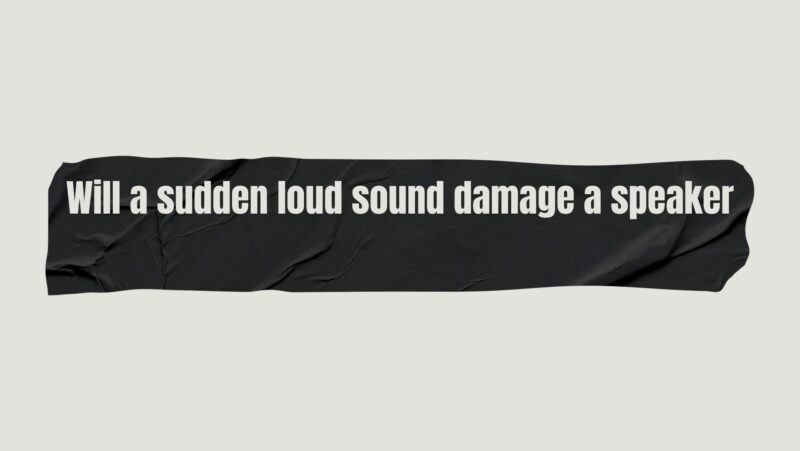Imagine yourself immersed in a quiet moment, savoring the serenity around you, when suddenly, a deafeningly loud sound erupts, reverberating through the air. In such instances, it’s natural to wonder about the consequences of this abrupt auditory assault on the speakers responsible for producing that sound. Will a sudden loud sound cause irreparable damage to the speakers, or are they designed to withstand such shocks? This article delves into the intricate relationship between sudden loud sounds and speaker durability, shedding light on the mechanisms at play and the potential outcomes.
The Resilience of Speaker Components
To comprehend how speakers react to sudden loud sounds, it’s crucial to understand the resilience of their individual components. Speakers consist of intricate parts like the diaphragm, voice coil, magnets, and suspension system. These components are engineered to handle a range of audio signals, including sudden spikes in volume. The diaphragm, for instance, is designed to move back and forth in response to electrical signals, thereby generating sound waves. The voice coil, which is responsible for driving the diaphragm’s movement, is constructed to withstand heat generated during operation.
Sudden Loud Sounds: A Sonic Jolt
A sudden loud sound, often referred to as a transient, is characterized by an instantaneous and substantial increase in sound pressure levels. These transients can emerge from various sources, such as feedback loops, sudden loud bursts in music or speech, or even unexpected loud noises in the environment. When such a sound reaches the speaker, the diaphragm’s movement becomes more pronounced due to the rapid increase in the amplitude of the sound waves.
Impact on Speaker Components
- Diaphragm Movement: The diaphragm’s movement becomes more intense in response to a sudden loud sound, as it strives to replicate the sudden surge in sound waves. While modern speaker diaphragms are engineered to handle a variety of audio signals, including transients, excessive and frequent exposure to sudden loud sounds can strain the diaphragm’s structure. This strain might lead to distortion, affecting the sound quality produced by the speaker.
- Voice Coil and Heat: The voice coil, responsible for driving the diaphragm, generates heat during operation. Sudden loud sounds can force the voice coil to work harder, resulting in an increase in temperature. While voice coils are designed to tolerate moderate temperature fluctuations, prolonged exposure to high temperatures caused by frequent sudden loud sounds could lead to overheating and potential damage.
- Suspension System: The suspension system, including the surround and spider, maintains the diaphragm’s alignment and assists in its movement. Sudden loud sounds could subject these components to excessive stress, potentially affecting their longevity and contributing to performance issues.
Mitigating the Impact
- Amplifier and Sound Source Control: Employing an appropriate amplifier and sound source control can significantly mitigate the impact of sudden loud sounds. Using a limiter or compressor can help control sudden spikes in audio signals, preventing the speakers from being pushed beyond their limits.
- Quality of Components: Investing in high-quality speakers with robustly engineered components enhances their ability to withstand sudden loud sounds. High-end speakers often come equipped with advanced designs that mitigate the strain caused by transients.
- Protective Mechanisms: Some modern speakers include protective mechanisms, such as built-in circuitry that automatically adjusts the signal in response to sudden spikes. This safeguard prevents excessive stress on the speaker components.
- Placement and Positioning: Proper placement and positioning of speakers can also contribute to minimizing the impact of sudden loud sounds. Avoid placing speakers too close to reflective surfaces that might amplify transients.
Conclusion
Sudden loud sounds possess the potential to challenge the resilience of speaker components, but the modern engineering behind these audio devices has equipped them to handle such challenges to a certain extent. While occasional exposure to sudden loud sounds might not cause significant harm, the cumulative effect of frequent and excessive transients can lead to issues like distortion, reduced performance, and even damage to speaker components. As technology continues to evolve, manufacturers are incorporating protective mechanisms and innovative designs to enhance speakers’ ability to withstand these shocks. For audio enthusiasts and professionals alike, understanding the intricacies of how sudden loud sounds impact speakers can contribute to informed decisions regarding speaker usage, maintenance, and longevity.


